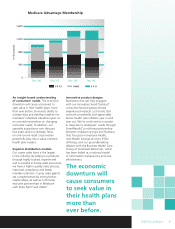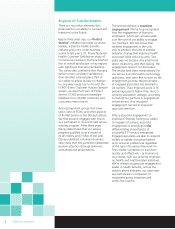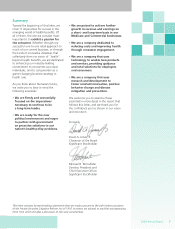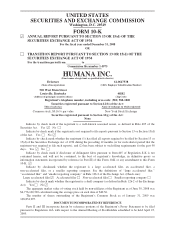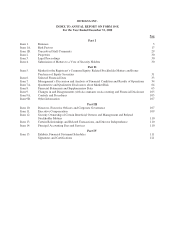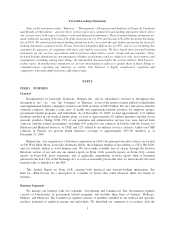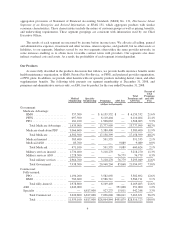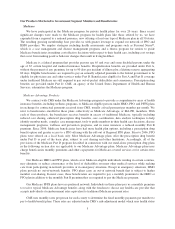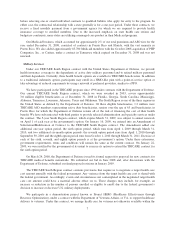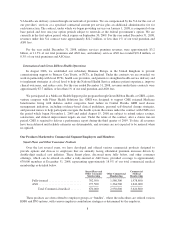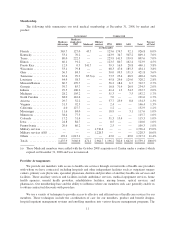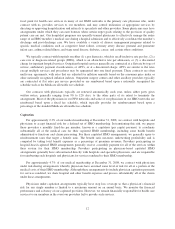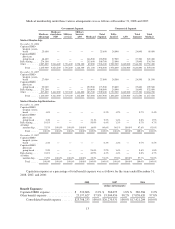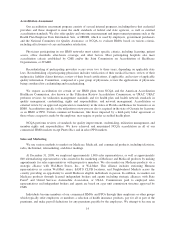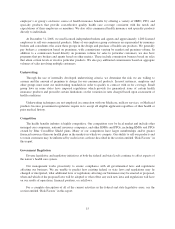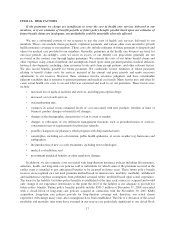Humana 2008 Annual Report Download - page 17
Download and view the complete annual report
Please find page 17 of the 2008 Humana annual report below. You can navigate through the pages in the report by either clicking on the pages listed below, or by using the keyword search tool below to find specific information within the annual report.before selecting one or award individual contracts to qualified bidders who apply for entry to the program. In
either case, the contractual relationship with a state generally is for a one-year period. Under these contracts, we
receive a fixed monthly payment from a government agency for which we are required to provide health
insurance coverage to enrolled members. Due to the increased emphasis on state health care reform and
budgetary constraints, more states are utilizing a managed care product in their Medicaid programs.
Our Medicaid business, which accounted for approximately 2% of our total premiums and ASO fees for the
year ended December 31, 2008, consisted of contracts in Puerto Rico and Florida, with the vast majority in
Puerto Rico. We also added approximately 85,700 Medicaid members with the October 2008 acquisition of PHP
Companies, Inc., or Cariten, under a contract in Tennessee which expired on December 31, 2008 and was not
renewed.
Military Services
Under our TRICARE South Region contract with the United States Department of Defense, we provide
health insurance coverage to the dependents of active duty military personnel and to retired military personnel
and their dependents. Currently, three health benefit options are available to TRICARE beneficiaries. In addition
to a traditional indemnity option, participants may enroll in a HMO-like plan with a point-of-service option or
take advantage of reduced copayments by using a network of preferred providers, similar to a PPO.
We have participated in the TRICARE program since 1996 under contracts with the Department of Defense.
Our current TRICARE South Region contract, which we were awarded in 2003, covers approximately
3.0 million eligible beneficiaries as of December 31, 2008 in Florida, Georgia, South Carolina, Mississippi,
Alabama, Tennessee, Louisiana, Arkansas, Texas and Oklahoma. The South Region is one of the three regions in
the United States as defined by the Department of Defense. Of these eligible beneficiaries, 1.2 million were
TRICARE ASO members representing active duty beneficiaries, seniors over the age of 65 and beneficiaries in
Puerto Rico for which the Department of Defense retains all of the risk of financing the cost of their health
benefit. We have subcontracted with third parties to provide selected administration and specialty services under
the contract. The 5-year South Region contract, which expires March 31, 2009, was subject to annual renewals
on April 1 of each year at the government’s option. On January 16, 2009, we entered into an Amendment of
Solicitation/Modification of Contract to the TRICARE South Region contract. The Amendment added one
additional one-year option period, the sixth option period, which runs from April 1, 2009 through March 31,
2010, and two additional six-month option periods: the seventh option period runs from April 1, 2010 through
September 30, 2010 and the eighth option period runs from October 1, 2010 through March 31, 2011. Exercise of
each of the sixth, seventh, and eighth option periods is at the government’s option. Under these extensions,
government requirements, terms and conditions will remain the same as the current contract. On January 22,
2009, we were notified by the government of its intent to exercise its option to extend the TRICARE contract for
the sixth option period.
On March 24, 2008, the Department of Defense issued its formal request for proposal for new contracts for
TRICARE medical benefits nationwide. We submitted our bid in June 2008 and, after discussions with the
Department of Defense, submitted our final proposal revisions in January 2009.
The TRICARE South Region contract contains provisions that require us to negotiate a target health care
cost amount annually with the federal government. Any variance from the target health care cost is shared with
the federal government. Accordingly, events and circumstances not contemplated in the negotiated target health
care cost amount could have a material adverse effect on us. These changes may include, for example, an
increase or reduction in the number of persons enrolled or eligible to enroll due to the federal government’s
decision to increase or decrease U.S. military deployments.
We participate in a demonstration project known as Project HERO (Healthcare Effectiveness through
Resource Optimization), under a contract with the Department of Veterans Affairs, or VA, to support healthcare
delivery to veterans. Under this contract, we arrange health care for veterans not otherwise available within the
7


